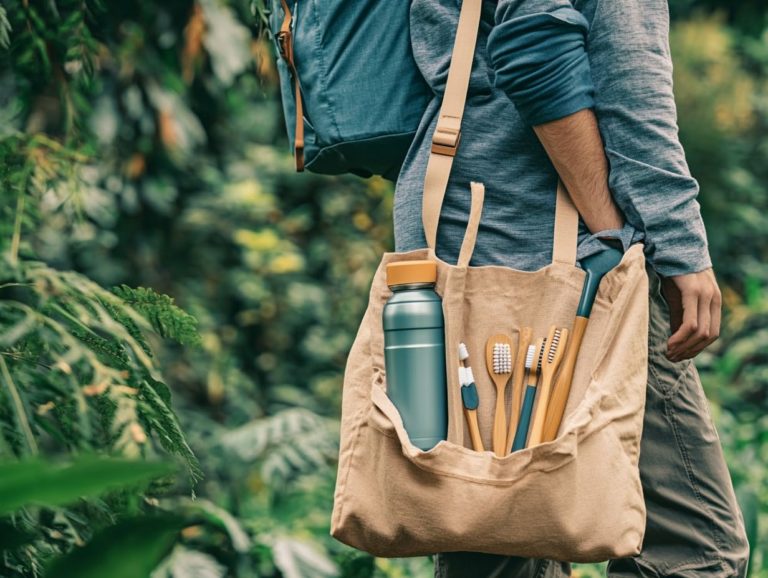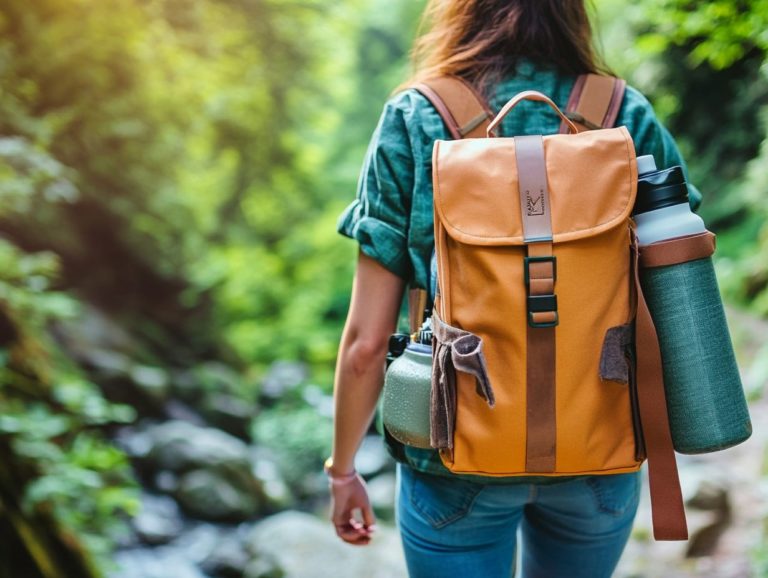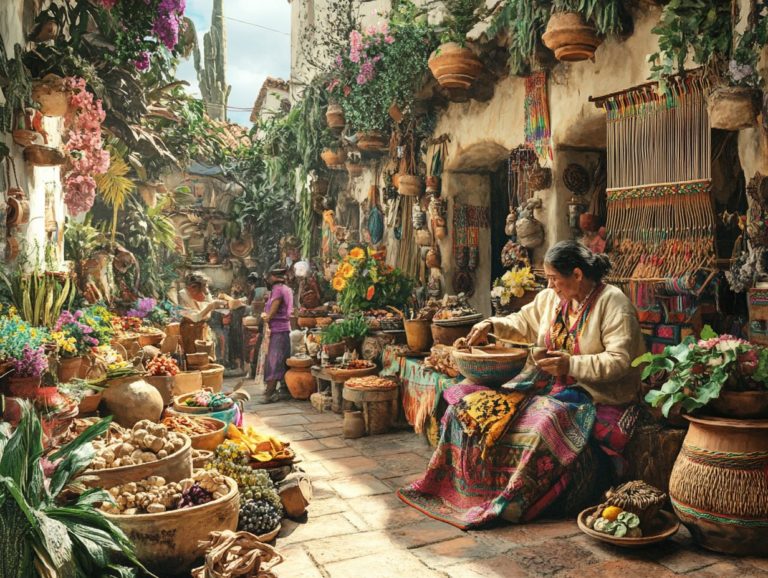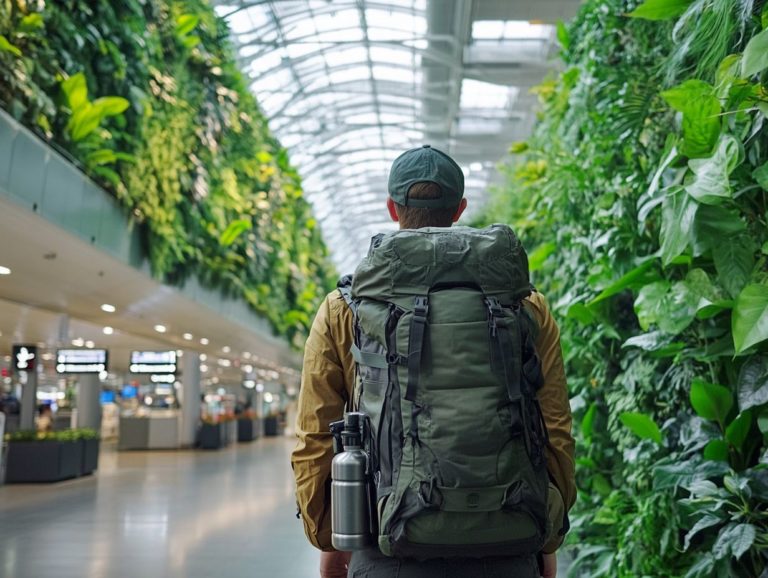7 Tips for Engaging with Local Cultures Responsibly
Travelling offers you a gateway to vibrant cultures and diverse experiences, yet engaging with local traditions demands mindfulness and respect.
In this article, you ll find seven essential tips to connect with communities in a responsible and enriching manner. By researching local customs and supporting local communities, you can enhance your travel experience while ensuring a positive impact on the places you visit.
Explore how to travel thoughtfully and navigate the intricacies of cultural engagement, enriching both your journey and the lives of those you encounter while promoting getting involved in local culture.
Contents
- Key Takeaways:
- 1. Do Your Research Beforehand
- 2. Respect Local Customs and Traditions
- 3. Learn Some Basic Phrases
- 4. Dress Appropriately
- 5. Support Local Businesses
- 6. Be Mindful of Your Impact on the Environment
- 7. Educate Yourself on the Country’s History
- Why Is It Important to Engage with Local Cultures Responsibly?
- Frequently Asked Questions
- What are the 7 tips for engaging with local cultures responsibly?
- Why is it important to engage with local cultures responsibly?
- How can educating oneself about the culture help with responsible engagement?
- What are some ways to support local businesses while engaging with local cultures responsibly?
- How can one communicate effectively and respectfully while engaging with local cultures?
- What are some examples of being mindful of one’s actions and impact while engaging with local cultures?
Key Takeaways:
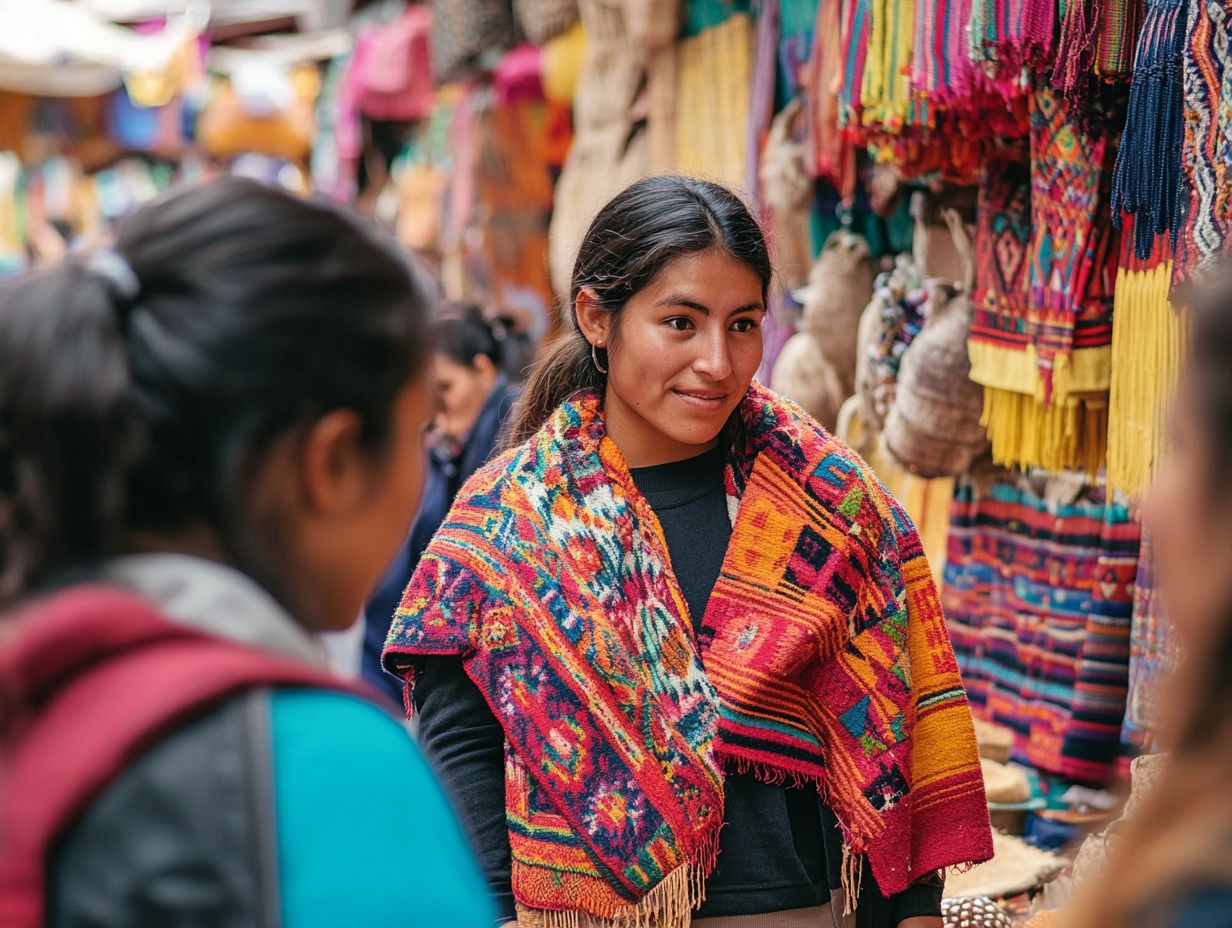
- Research local culture to avoid insensitivity and appreciate the arts.
- Respect and follow local customs and traditions to show appreciation for the culture.
- Learn basic phrases in the local language to connect with locals and foster mutual respect.
1. Do Your Research Beforehand
Before you embark on your journey, conducting thorough research is essential for ensuring a travel experience that respects local customs and embraces getting involved in local culture while contributing to economic empowerment in local communities.
Taking the time to explore various resources can greatly enhance this process. Travel blogs often provide personal insights into hidden gems and unique experiences. Meanwhile, government tourism websites offer official information about cultural practices and events. Delving into community initiatives can lead you to responsible travel activities that benefit local neighborhoods and promote sustainable development.
Understanding local customs is crucial. It enriches your interactions and fosters a deeper appreciation for your destination. Equipping yourself with knowledge about cultural heritage, such as traditional festivals or local cuisine, promotes meaningful engagement with the community. This ultimately paves the way for impactful travel experiences and heritage preservation.
2. Respect Local Customs and Traditions
Respecting local customs and traditions is essential for cultivating cultural awareness and ensuring that your travel experience is both authentic and rewarding.
Being mindful of practices like greeting locals in their native language or participating in traditional ceremonies can enhance your interactions significantly. For example, in many communities, sharing a meal, especially local food or authentic dishes, serves as a powerful symbol of friendship and trust. To further enrich your experience, consider learning how to support indigenous cultures while traveling, which creates perfect opportunities for meaningful conversations.
Understanding the significance of local festivals and dressing appropriately when attending them reflects your appreciation for their customs. It also fosters deeper connections. By approaching your travels with genuine interest in learning and engaging, you open the door to memorable experiences and profound insights into the local way of life, ultimately enriching your journey.
3. Learn Some Basic Phrases
Learning some basic phrases in the local language helps you connect better with local communities and immerse yourself in their culture. When you communicate in the locals’ tongue, you unlock the door to genuine connections and authentic experiences that transcend mere sightseeing.
Even simple greetings or expressions of gratitude can lead to heartwarming interactions, making locals feel valued and appreciated. To navigate this journey effectively, focus on key phrases relevant to daily situations, like ordering food or asking for directions, which may include traditional cuisine. Engaging with residents in their language fosters mutual respect and deepens your understanding of local customs, enabling personal development.
Utilizing language apps or practicing with locals can boost your confidence and create lasting memories that you’ll cherish long after your travels.
Get ready to create unforgettable memories while traveling responsibly!
4. Dress Appropriately
Dressing appropriately for your destination is vital for travel etiquette. It shows your respect for local customs and promotes cultural sensitivity.
Aligning your attire with local expectations enhances your personal experience. It reflects mindfulness that positively influences your interactions with the local community. For instance, modest clothing is essential at religious sites like temples and churches, where all visitors are expected to cover their arms and legs.
During local festivals, wearing traditional attire shows your appreciation for culture. This fosters a sense of belonging and respect. By following these dress codes, you can forge deeper connections and enrich your adventures, ensuring you embrace cultural sensitivity while traveling.
5. Support Local Businesses
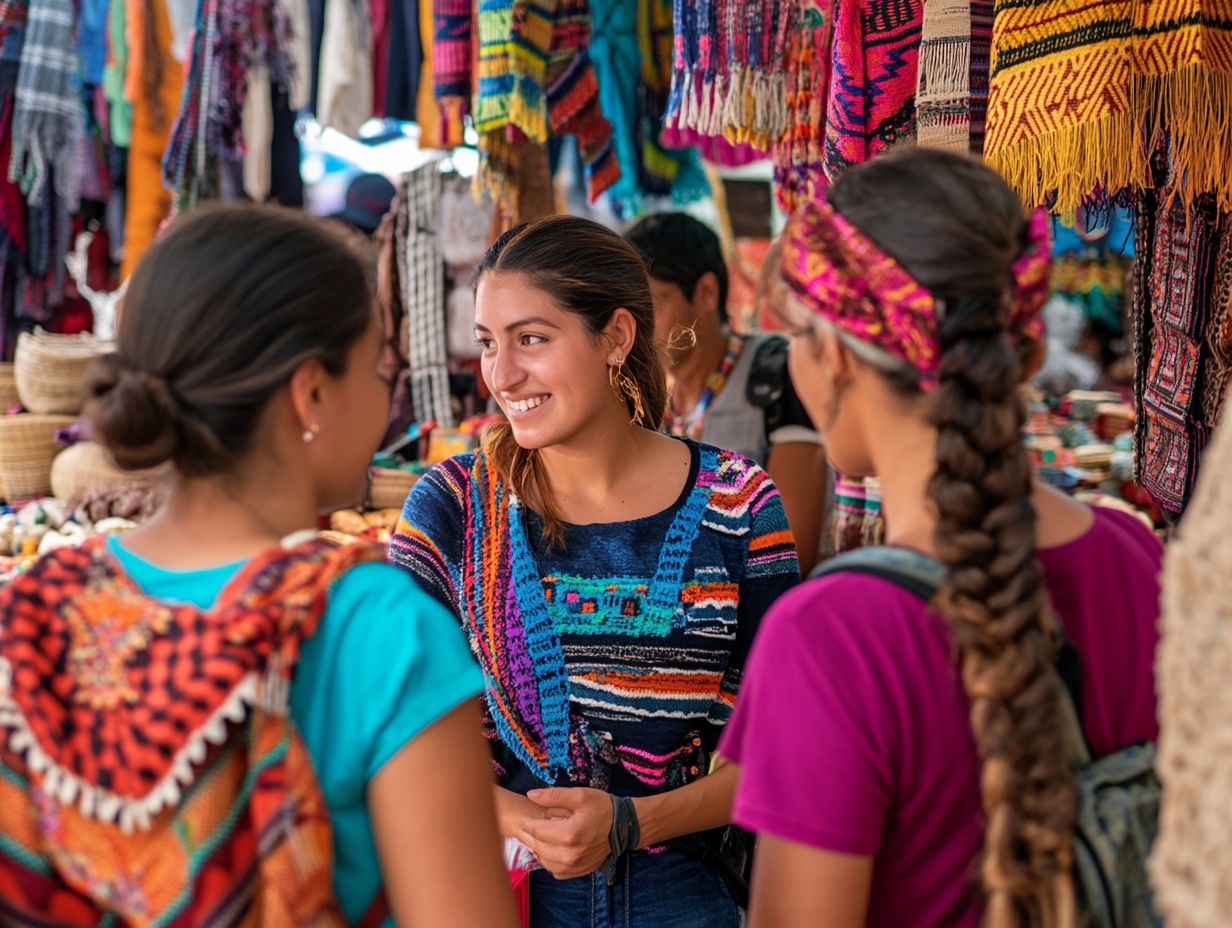
Supporting local businesses enriches your travel experience and empowers communities.
Choosing locally managed accommodations, such as bed and breakfasts, immerses you in unique environments that embody the local culture and spirit.
Dining at local restaurants offers authentic culinary delights and supports chefs and staff with deep community ties. Each bite is a taste of the culture.
Shopping at local markets lets you discover handcrafted goods and artisanal craftsmanship. Your purchases directly support the artisans, ensuring your choices foster sustainable community initiatives.
6. Be Mindful of Your Impact on the Environment
Being mindful of your environmental impact is essential for promoting eco-friendly tourism. This ensures the sustainability of local ecosystems and cultures.
Adopt practical strategies like using public transport. It reduces carbon emissions and allows you to experience destinations authentically.
Engaging in responsible activities, such as volunteering for local conservation projects, enriches your travel experience. It promotes understanding of local culture and social empowerment.
Support eco-friendly initiatives, like local artisans and sustainable restaurants. These choices minimize environmental harm and contribute to a more immersive and respectful travel experience.
7. Educate Yourself on the Country’s History
Educating yourself about the country s history is essential for deepening your cultural understanding and elevating your travel experiences. It provides valuable historical context.
By grasping the influential events and societal developments that have shaped local customs, you gain context for the cultural heritage you encounter. This ensures a meaningful cultural exchange. For example, understanding the significance of regional festivals, traditional crafts, or culinary practices can transform an ordinary visit into a profoundly meaningful experience.
To uncover this insight, resources like historical documentaries, local museums, and oral histories can be incredibly beneficial. Immersing yourself in these materials not only enhances your appreciation but also paves the way for more authentic interactions with community members who value cultural sensitivity. They often take pride in sharing their stories and traditions with those who show genuine interest in their history.
Why Is It Important to Engage with Local Cultures Responsibly?
Engaging with local cultures responsibly fosters meaningful cultural exchange and understanding, leading to economic empowerment for communities. This approach boosts your travel experience and promotes personal growth and social enablement.
When you approach cultural interactions with respect and openness, you immerse yourself in authentic experiences that go beyond mere tourism. This mindful engagement allows you to be a responsible tourist and contribute positively to the preservation of local traditions, helping communities flourish while honoring their unique identities.
Embracing cultural sensitivity opens the door to deeper connections with local people. This nurtures mutual respect and appreciation while supporting the local economy. These interactions enrich your perspective and create a platform for shared stories and experiences, ultimately paving the way for harmonious coexistence where cultures uplift and learn from one another. Understanding travel etiquette: respecting local customs can greatly enhance these experiences.
What Are the Potential Consequences of Not Engaging Responsibly?
Neglecting to engage responsibly with local cultures can lead to significant negative repercussions, including cultural appropriation and strained relationships with local communities. This undermines social change and positive impact.
When you overlook the importance of understanding and respecting cultural nuances, you risk perpetuating harmful stereotypes and misrepresentations. This contributes to the erosion of community initiatives. For instance, when traditional attire is commercialized for profit without recognizing its significance, it can alienate the very communities you intend to celebrate. Such thoughtless actions may lead to backlash, fostering resentment and eroding trust.
True social change thrives on mutual respect and genuine interaction, enabling communities to share their stories authentically. By embracing this approach, you cultivate positive relationships and open doors for collaboration that benefits everyone involved.
How Can One Avoid Cultural Appropriation?
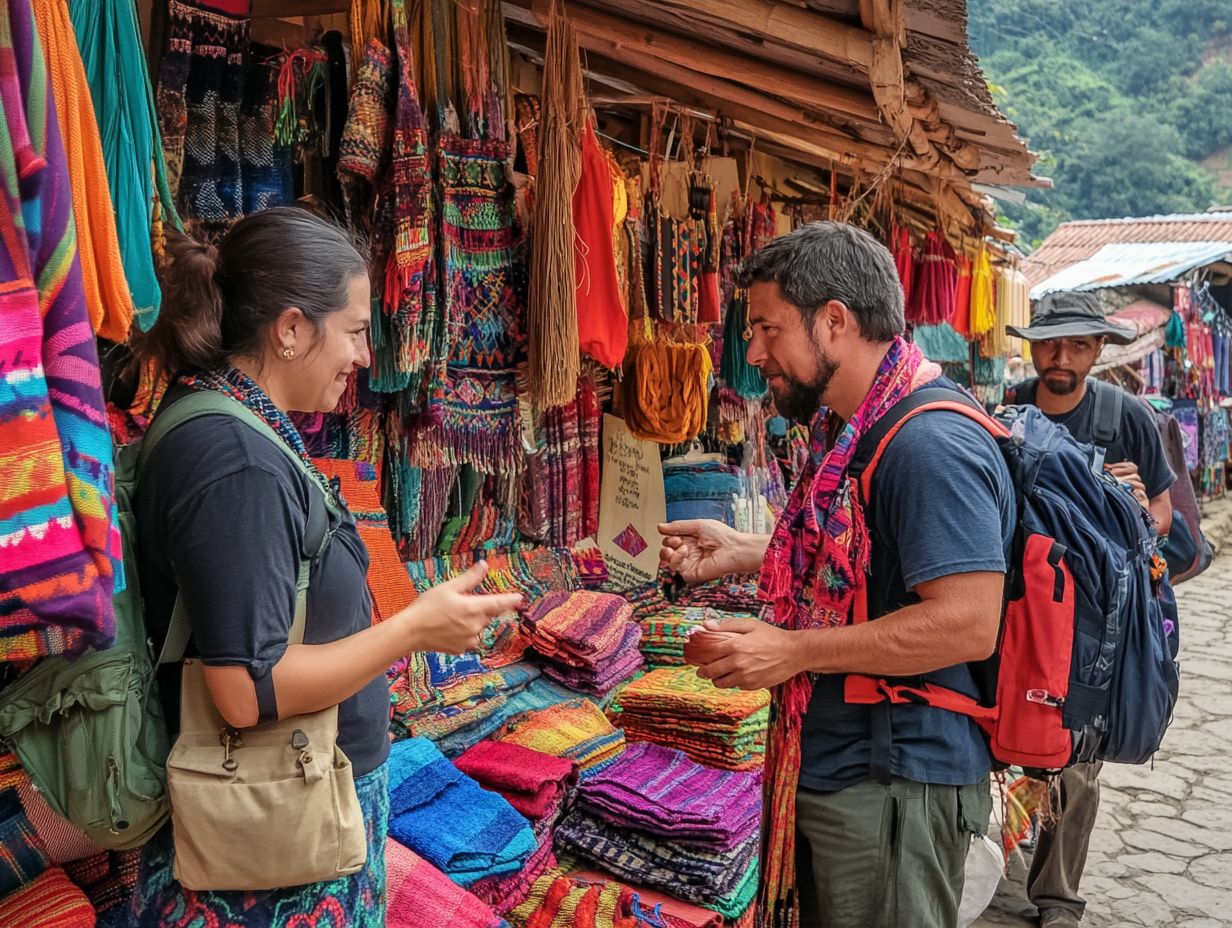
Avoiding cultural appropriation is crucial for ensuring cultural sensitivity and respecting the local culture. This fosters mutual respect and elevates your travel etiquette.
Understanding the nuances of cultural practices and traditions is vital for you as a traveler seeking genuine connections. When engaging with local customs, approach them with curiosity and humility, rather than a sense of entitlement. Additionally, consider following 7 tips for sustainable travel photography to ensure your adventures respect the cultures you encounter.
One effective way to honor local culture is by participating in workshops or community events led by locals. This allows you to enjoy immersive learning experiences. You can also ask for permission before photographing individuals or sacred sites, and support local artisans by purchasing handmade crafts instead of mass-produced souvenirs. For more tips, check out these 7 tips for sustainable travel in Asia.
By prioritizing genuine interactions and appreciating the rich tapestry of local traditions, you contribute positively to the cultural landscape you are exploring.
What Are Some Common Mistakes to Avoid When Engaging with Local Cultures?
Common mistakes when engaging with local cultures often arise from a lack of cultural understanding, which can impede meaningful interactions.
You might inadvertently stereotype communities or make assumptions about local traditions, leading to awkward moments or, worse, causing offense. For example, wearing traditional attire without grasping its significance can be perceived as disrespectful.
Get ready to engage respectfully by learning about local customs and traditions before your visit. This effort will not only deepen your understanding but also pave the way for authentic relationships with locals.
Embracing mindful travel by asking questions and demonstrating genuine interest can transform potential misunderstandings into enriching experiences, enhancing your appreciation for the diverse cultures you encounter along your journey. To further enhance your travel experience, consider these 7 tips for ethical travel in developing countries.
How Can One Leave a Positive Impact on the Local Community?
Leaving a positive impact means actively engaging in initiatives that foster helping the local economy and sharing cultures. By choosing to volunteer your time and skills, you can directly address local needs and strengthen connections with residents, ultimately nurturing a sense of unity.
Supporting local businesses boosts the economy and preserves the unique identity and culture of the area you re visiting. When you engage with community initiatives like participating in clean-up drives or workshops you contribute meaningfully while immersing yourself in the traditions and values of the locals.
In this way, responsible travelers play a vital role in promoting sustainable development, ensuring that your presence supports and uplifts diverse communities.
What Are Some Examples of Responsible Cultural Engagement?
Engaging responsibly with culture means immersing yourself in local traditions, supporting artisans, and seeking out authentic experiences that truly respect the essence of the culture.
For instance, dive into local festivals, where you can experience the vibrant customs and rituals that shape a community. This allows you to cultivate a genuine appreciation for its heritage. When you purchase handmade souvenirs, you re not just acquiring a unique memento; you re also championing local artisans and encouraging the preservation of traditional craftsmanship.
Participating in community-led experiences, such as cooking classes or guided nature walks, offers you the chance to learn directly from locals, breaking down cultural barriers and enriching your understanding of daily life in that environment. By following responsible travel practices, these actions do more than enhance your personal journey; they also play a vital role in sustaining and revitalizing cultural practices.
Frequently Asked Questions
What are the 7 tips for engaging with local cultures responsibly?
- Educate yourself about the culture
- Respect local customs and traditions
- Support local businesses and communities
- Communicate effectively and respectfully
- Dress appropriately and modestly
- Be mindful of your actions and impact
- Learn a few phrases in the local language.
Why is it important to engage with local cultures responsibly?
Engaging with local cultures responsibly is crucial because it allows for respectful and authentic interactions with the community, promotes mutual understanding and appreciation, and helps to preserve the cultural heritage and traditions of the local people.
How can educating oneself about the culture help with responsible engagement?
Educating oneself about the culture enhances responsible engagement by providing a better understanding of the customs, values, and beliefs of the local people. This helps avoid unintentionally causing offense or disrespect and fosters meaningful connections with the community.
What are some ways to support local businesses while engaging with local cultures responsibly?
Support local businesses by purchasing goods and services from local vendors, dining at locally owned restaurants, and participating in cultural activities and experiences offered by the community.
How can one communicate effectively and respectfully while engaging with local cultures?
Communicating effectively starts with being aware of how cultures communicate differently. Avoid making assumptions or stereotypes.
Listening actively is crucial for making genuine connections. Show a real interest in learning about the culture and its people.
What are some examples of being mindful of one’s actions and impact while engaging with local cultures?
Be conscious when taking photos or videos of people or sacred sites. Respect local environmental practices and conservation efforts.
Also, understand the potential consequences of your actions on the local community. Every action can have a lasting impact!

